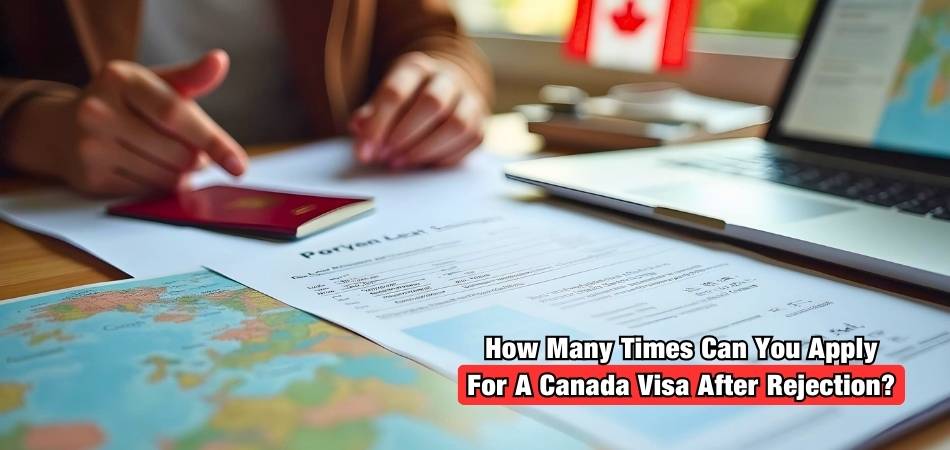Applying for a Canada visa is an essential step for individuals planning to visit, work, or study in this beautiful and opportunity-filled country. However, facing a visa rejection can be disheartening and raises the question: How many times can you apply for a Canada visa after rejection?
The good news is, there is no specific limit on the number of reapplications. Each application is treated independently, but it’s vital to address the reasons for your previous rejection and provide new or improved information to strengthen your case.
This article outlines actionable steps to help you better figure out the process for submitting a successful visa application. Keep reading for valuable insights!
Canada Visa Application Process – Is It Complex One?
Yes, the Canada visa application process can be complex, depending on the visa type and the applicant’s individual situation. The requirements differ based on the purpose of travel, such as tourism, work, or study. Meeting deadlines and submitting the correct documents are key success factors.

Knowing the required forms and gathering supporting documents takes effort but is manageable with proper preparation. Applicants often find proof of financial stability and intent to return home challenging. Missteps like missing details or incomplete forms can lead to delays or rejection.
Seeking guidance from trusted sources or immigration experts helps simplify the process and avoid mistakes. Careful planning ensures your application aligns with the requirements and improves approval chances. With patience and focus, managing this process becomes less overwhelming.
Are There Any Chances of The Canadian Visa Application Being Rejected?
Yes, there are chances of the Canadian visa application being rejected. Being aware of the reasons behind rejections is essential for success. If you have applied for a visa, here are some of the common causes of visa application rejection and ways to avoid them:
Missing or Incomplete Documentation
Providing accurate and complete documents is crucial for visa approval. Missing forms or unclear copies can result in rejection. Ensure all requested paperwork matches the application checklist exactly. Double-checking details reduces the risk of missing key requirements.
Financial Insufficiency
Applicants must prove they can support themselves financially during their stay in Canada. Insufficient funds often lead to application denial. Include clear and verified financial statements to strengthen your case. It gives immigration officers a sense of security to prepare accurate proof of finances.
Unclear Purpose of Visit
The purpose of your visit must be clear and well-documented. Irregular or incomplete explanations often result in visa rejection. Clearly state your travel intentions with relevant supporting documents. Your application will stand out as credible if you have strong evidence.
Incorrect Information or Errors
Errors in the forms or false information can lead to rejection of the application. Even small mistakes might create doubts about your application. Review all details thoroughly before submission to avoid costly errors. Honesty and accuracy improve your chances significantly.
Previous Travel History Issues
Past visa refusals or overstays in other countries can affect approval. Immigration officers carefully evaluate an applicant’s travel history. It is essential to provide valid explanations and reasons for past issues. Addressing concerns with transparency improves your application’s credibility.
A good awareness of these top reasons for Canada visa rejection can help applicants avoid common pitfalls. You will have a much better chance of success if you prepare thoroughly.
How Many Times Can You Apply for a Canada Visa After Rejection?
When applying for a Canada visa, a rejection can be disheartening, but it’s not the end of the road. There is no set limit on how many times you can reapply after a rejection. Each new application is assessed on its own merits, independent of past outcomes. It’s crucial to figure out what led to the previous denial and address those issues.
If your visa application was rejected, reviewing the reasons provided by the immigration authorities is vital. This feedback is invaluable for making necessary adjustments to your next application. Applicants should ensure that they meet all the stated requirements more convincingly in their subsequent attempts. Reapplying without any changes or additional information is likely to result in another rejection.
Strengthening your application can significantly increase your chances of success. This might involve providing more complete proof of financial stability or clarifying your travel itinerary. Each piece of added information helps build a stronger case for your visit. Consulting with an immigration expert can also provide guidance and increase your chances of approval.
Remember, persistence is key in the visa application process. Learning from past mistakes and continuously improving your application shows determination and seriousness. While there are no guarantees, a well-prepared application addressing previous concerns raises the likelihood of a favorable outcome. Keep trying, and each application will be a step closer to approval.
What Documents Should You Review Before Reapplying For a Canadian Visa?
Reapplying for a Canadian visa can feel challenging, but addressing past issues improves your chances. Reviewing the necessary documents carefully increases the possibility of getting a Canada visa after rejection. The following information highlights the most important documents to check before reapplying.
Passport Validity
Your passport must be valid for the entire duration of your intended stay in Canada. Expired or damaged passports lead to immediate rejection. Ensure your passport has enough blank pages for visas or stamps. Renew your passport if it doesn’t meet these requirements.
Application Forms
Carefully review all application forms to correct errors or incomplete details from your previous submission. Ensure names, dates, and addresses are accurate. Double-check that all sections of the forms are fully completed. Providing truthful and consistent information is crucial for approval.
Financial Proof
Immigration officials require proof that you can support yourself during your stay. Review your bank statements to ensure they show sufficient funds. Provide additional financial documents, like investment statements or proof of sponsorship, if necessary. These documents must be recent and authentic.
Travel History
Your travel history should be consistent and aligned with the information on your application. Check previous visa stamps and entry/exit records for accuracy. Address any discrepancies or past overstays with a valid explanation. Honesty in presenting your travel record is vital.
Supporting Documents
Review documents supporting your travel purpose, such as an invitation letter or work offer. Ensure they match the details in your application. Updated or more accurate documents strengthen your case. Missing or outdated information can lead to rejection again.
Proof of Ties to Home Country
Demonstrate strong ties to your home country to assure immigration authorities of your return intent. Provide property documents, family obligations, or employment letters. Clear evidence of connections reduces doubts about your travel intentions. Review and improve these documents if needed.
Tips for a Stronger Canada Visa Application After Rejection
Facing a Canada visa rejection can be discouraging, but it’s not the end of the road. By improving your application and addressing the reasons for rejection, you can boost your chances. Here are practical tips to create a stronger application.
Be aware of the Rejection Reasons
Carefully read the rejection letter to identify why your application was denied. Focus on immigration officials’ specific concerns. Addressing these points directly shows that you’ve taken steps to improve. A specialized response to concerns increases approval chances.
Update the Supporting Documents
Outdated or incomplete documents can weaken your application significantly. Submit updated proof of employment, financial status, or other required documents. Ensure all supporting documents align with the purpose of your visit. Updated paperwork helps demonstrate credibility and preparedness.
Improve Financial Proof
Immigration officials assess your financial stability to ensure you can support yourself. Provide clear, recent bank statements showing sufficient funds. Include other financial assets or sponsorship letters if applicable. A strong financial foundation creates confidence in your ability to manage expenses.
Clarify Travel Purpose
A well-documented travel purpose reduces doubts about your intentions. Clearly explain why you’re visiting Canada with relevant documents, like itineraries. If you’re traveling for work or study, including offer letters or enrollment details. Clear intentions help establish trust with immigration officers.
Highlight Ties to Home Country
Strong ties to your home country reassure officials that you’ll return after your visit. Include property deeds, family responsibilities, or job commitments. Highlighting these connections reduces suspicion of overstaying intentions. Strong ties make your application more convincing.
Seek Expert Advice
Consulting an immigration expert provides valuable insights to strengthen your application. Experts can identify gaps and suggest ways to improve. Their experience can guide you in meeting immigration requirements more effectively. Professional advice often makes a big difference in approval chances.
Review and Double-Check Forms
Errors in forms, even minor ones, can lead to rejections. Carefully review your application for accuracy and completeness. Verify that all details match supporting documents to avoid inconsistencies. A thorough review ensures a polished and professional submission.
Frequently Asked Questions (FAQs)
Applying for a Canada visa can be challenging, especially after a rejection. Having clear answers to common questions can simplify the process and guide applicants in improving their chances. Below are some frequently asked questions with helpful and practical answers:
Should You Reapply Immediately After Rejection?
It’s better to wait and carefully prepare a stronger application. Addressing the concerns in your rejection letter is essential. Submit improved documents, financial proof, or additional explanations before reapplying to enhance your chances of approval.
Does Rejection Affect Future Applications?
Rejection does not automatically impact future applications. However, repeated rejections for similar issues may raise concerns. Providing clear explanations and addressing past issues directly improves your credibility in future applications.
Are Reapplication Fees the Same as Initial Applications?
Yes, reapplication fees are the same as for first-time applications. Ensure your new application is stronger to avoid additional costs. Review all requirements thoroughly before paying fees to ensure your documents meet the criteria.
Does Rejection Mean You Cannot Enter Canada?
No, a visa rejection does not bar you from future travel to Canada. You can reapply anytime after addressing rejection issues. A stronger application demonstrates your eligibility and intent to comply with visa rules.
Is It Necessary to Hire an Immigration Consultant?
It is not mandatory but highly recommended for complex cases. Consultants provide professional advice and ensure your application meets requirements. Their expertise can identify weaknesses and suggest solutions, increasing your chances of approval.
Conclusion
Managing the complexities of reapplying for a Canadian visa after an initial rejection requires diligence and a thorough knowledge of the reasons behind the refusal. By comprehensively addressing these issues, improving your documentation, and refining your application’s clarity regarding finances and the purpose of the visit, you can significantly raise your chances of success.
If you’re wondering, “How many times can you apply for a Canada visa after rejection?” Remember, there’s no set limit, but each attempt should be stronger and more precise. The process highlights the importance of persistence, learning from past mistakes, and thoroughly preparing each document. With careful planning and possibly seeking expert advice, you can improve the likelihood of achieving a favorable outcome.







